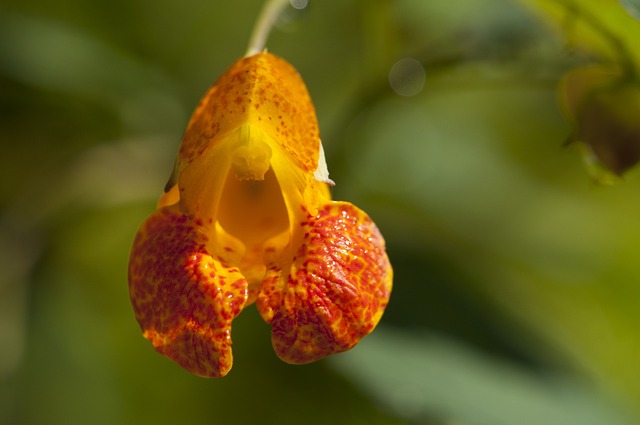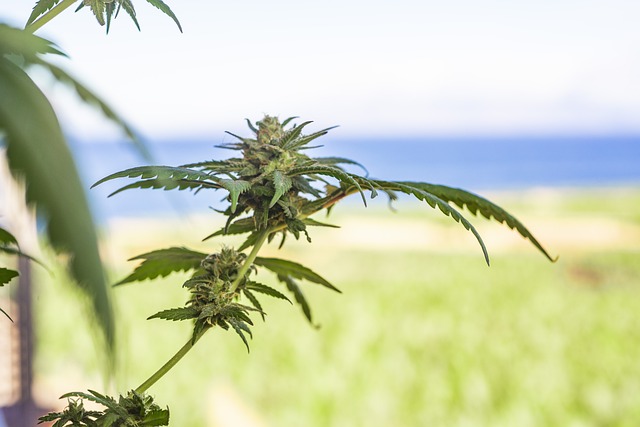
The THCA flower, a non-psychoactive component of cannabis, has been identified for its notable anti-inflammatory properties. It interacts with the endocannabinoid system by binding to CB1 and CB2 receptors, which play a crucial role in modulating immune responses. This interaction helps regulate cytokine production, potentially reducing inflammation associated with conditions such as arthritis and colitis. Unlike THC, the psychoactive form of cannabinoid, THCA flower offers a promising alternative for managing pain without mind-altering effects in jurisdictions where medical cannabis is permitted. The anti-inflammatory benefits of THCA flower are also believed to extend beyond just CB1 and CB2 receptors, possibly influencing other signaling pathways like PPARs and TRP channels. Ongoing research continues to explore the full therapeutic potential of THCA flower in the realm of natural healthcare solutions for inflammatory diseases.
Exploring the therapeutic benefits of the THCA flower, this article delves into its promising anti-inflammatory properties. Known for its potential health advantages, the THCA flower, which is the raw form of marijuana before heating, has garnered attention for its natural approach to combating inflammation. We will dissect the science behind these effects, examining how THCA, the non-psychoactive cannabinoid, interacts with our bodies to alleviate inflammatory conditions. From clinical evidence and research findings to user experiences and cultivation tips, this piece offers a comprehensive look at the THCA flower’s role in managing inflammation, highlighting its significance as a potential treatment option. Join us as we unravel the potential of the THCA flower and its anti-inflammatory effects.
- Unveiling the Therapeutic Potential of THCA Flower: A Deep Dive into Its Anti-Inflammatory Effects
- The Science Behind THCA Flower's Role in Inflammation Reduction: Mechanisms and Applications
Unveiling the Therapeutic Potential of THCA Flower: A Deep Dive into Its Anti-Inflammatory Effects

The THCA flower, which is the raw, unheated form of cannabis that contains tetrahydrocannabinolic acid (THCA), has garnered attention for its potential therapeutic properties. Among these, the anti-inflammatory effects of THCA are particularly noteworthy. Studies have shown that THCA interacts with the body’s endocannabinoid system through its affinity for the CB1 and CB2 receptors, which play a crucial role in regulating immune responses. This interaction can lead to a modulation of cytokine production, a key mechanism in the inflammatory response. By inhibiting pro-inflammatory cytokines like TNF-alpha and interleukin-6, THCA may help alleviate symptoms associated with various inflammatory conditions, such as arthritis and colitis. Furthermore, the anti-inflammatory effects of THCA are believed to be a contributing factor to its potential in managing pain, without the psychoactive effects present in its decarboxylated form, THC. This makes THCA flower an attractive option for individuals seeking natural ways to manage inflammation and associated discomforts, particularly in areas where cannabis has been legalized for medical use. As research continues to evolve, the therapeutic potential of THCA flower is becoming increasingly apparent, with its anti-inflammatory effects being one of the most promising applications of this natural compound.
The Science Behind THCA Flower's Role in Inflammation Reduction: Mechanisms and Applications

Delta-9-tetrahydrocannabinolic acid (THCA) is the non-psychoactive precursor to the well-known psychoactive cannabinoid THC, found abundantly in cannabis flowers. Research into THCA’s potential health benefits has shown promising results, particularly in relation to its anti-inflammatory effects. The human body possesses a complex endocannabinoid system that plays a significant role in regulating numerous physiological processes, including inflammation. THCA interacts with this system through the activation of cannabinoid receptors such as CB1 and CB2, which are pivotal in modulating immune responses. By binding to these receptors, THCA is believed to inhibit the production of pro-inflammatory cytokines, thereby reducing inflammation. This action has been observed in various preclinical models, suggesting a potential therapeutic application for THCA in treating conditions characterized by excessive inflammation, such as arthritis and colitis, without the psychoactive side effects associated with THC.
Furthermore, studies have highlighted that THCA’s anti-inflammatory properties may extend beyond direct interaction with cannabinoid receptors. It is hypothesized that THCA may also influence other cell signaling pathways, including the peroxisome proliferator-activated receptors (PPARs) and transient receptor potential (TRP) channels, further enhancing its anti-inflammatory profile. The applications of THCA flower in this context are vast, with ongoing research aimed at elucidating its efficacy and safety as a complementary treatment for inflammation-related conditions. As scientific understanding of THCA’s mechanisms deepens, so too does the potential for innovative therapeutic interventions that harness its natural anti-inflammatory properties.
The exploration into the therapeutic properties of THCA flower has shed light on its significant anti-inflammatory effects, underscored by robust scientific evidence. This article has delved into the mechanisms that contribute to THCA flower’s role in mitigating inflammation, offering insights into its potential applications for those seeking natural relief from inflammatory conditions. The findings suggest that THCA flower may serve as a promising alternative or adjunct therapy, warranting further investigation to fully realize its benefits. As research continues to unfold, the potential of THCA flower in healthcare remains an exciting frontier in the quest for effective, plant-based treatments.


